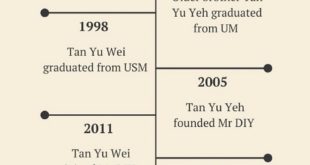So far this year, life as we know it has changed dramatically.
Most of us are grappling with the strangeness of turning our homes into our workplaces, while some might be worried about how much longer they can stay employed. Others, unfortunately, may have already faced the brunt of layoffs or furloughs.
The current global pandemic is pushing the world into a severe economic downturn, and the Monetary Authority of Singapore has confirmed that a recession is on its way — not just a slight dip, but possibly the worst recession the country has ever seen.
As the economy falters, people are anxious that their careers would turn rocky. While it seems like a lot of it is beyond our control, there are some ways in which we can take charge.
In fact, now is the best time to start future-proofing your career as the full impact of the recession has yet to be felt. Here are some ways you can get started:
1. Think A Step Ahead

Nobody wants to be caught off-guard by a sudden change (we’ve had plenty of that already), so do yourself a favour by preparing for a job in advance.
Regardless if there’s been talk of downsizing in your company, you can still take the first step.
Take this period as a time to update your resume — and while doing so, take stock of your achievements, best projects, and the skills you have developed at your current job.
There’s no harm in doing this even if everything seems stable at the moment. Preparing your resume early will make it easier to apply and transition to a new job when the need arises.
2. Identify ‘Recession-Proof’ Opportunities
If you’re planning to make a career switch, or looking for a new job after being retrenched, you would want to head in a direction that’s more secure than your last. Furthermore, if your current sector is not doing well in general, there may not be a large pool of job openings available.
There are no guaranteed ‘recession-proof’ industries, but some sectors definitely stand a better chance than others.
Think about services that will always be needed, regardless of the state of the economy. For example, industries such as healthcare, grocery and public utilities will remain intact because there will always be people who fall sick, or need food, water and electricity in their daily lives.

Healthcare is a huge priority amid this pandemic, and will remain that way even after Covid-19 is over. A recent report by Fitch Solutions found that healthcare in Singapore is expected to grow into a $ 29.8 billion market in 2020.
In line with the finding, Singapore has plans to build two new hospitals and 12 more polyclinics by 2030, with three of the polyclinics slated to open this year.
The demand for healthcare does not lie in just hospitals — it extends to pharmacies, physical therapy, senior care, and even mental health too.

Another area of opportunity can be found in digital innovation and technology. This does not refer to only tech startups, as businesses across almost all fields are increasing their digital capabilities.
Firms will have to rethink how they would operate after the pandemic is over, which will largely involve adapting to provide more digital services as consumer behaviour shifts online even further.
Following the growing technology trends, consumers will continue to spend more time online despite a looming recession. While companies may cut back their spending in some areas, they will still count on digital marketing, social media and e-commerce to reach their online audience.
Even now, some businesses already say they are facing 10 to 20 per cent greater demand for hiring tech talent.
3. Arm Yourself With Skills That Will Remain Relevant

It may seem daunting to aim for a completely new industry, especially when jobs in fields like healthcare require advanced degrees and years of training.
This is why equipping yourself with skills that will stay relevant across industries is important, and above all, it’s actually achievable.
Like the top jobs in demand suggest, digital skills are highly valued. As technology is all around us today, skills like digital marketing, data analytics, web development and cybersecurity are deemed as a good-to-have under your belt.
These skills can help open doors to many opportunities, as companies in virtually any industry would need tech and IT talent to help them keep up with digital transformation.
Upskilling is not only useful for those who want to make a mid-career switch. Diversifying your abilities can also make you a more attractive employee to retain, as companies may want workers to perform dual roles in order to save costs when finances are tight.
Learn Digital Skills From Industry Experts
We’ve established that now’s a great time to pick up digital skills, but with no prior experience, where do you start?
Smartcademy, one of Singapore’s leading training providers, wants to help people equip themselves and improve their employability during this economic downturn.
It is established by founders who are passionate about helping individuals keep up with the world’s rapid shift towards technology-driven industries. To do this, they don’t just churn out wide-ranging courses, but keep a strong focus on teaching skills that are in-demand and industry-relevant.
People looking to safeguard their careers against the recession can benefit from courses such as Digital Marketing, User Experience Design, Web Development and Mobile App Development.

Smartcademy is particular about the quality of lessons they provide, and hires a coaching team of experts with many years of collective experience in the market.
They also believe that everyone needs to start somewhere, even if that “somewhere” means their students have no relevant background.
Teaching beginners doesn’t mean they only scratch the surface though. For example, their ‘Intro to Digital Marketing’ course dives deep into the topic over six days, with each lesson running for three hours.
By the end of the course, students will learn about what influences SEO rankings, how to understand insights from Google Analytics, and how to run digital ads and conduct A/B testing. They will also get hands-on experience in testing and executing their own marketing campaigns.
Smartcademy offers all of its courses at a flat rate of $ 2,500. If this sounds steep to you, you’ll be happy to know that eligible Singaporeans and PRs can apply for funding support for up to 90 per cent of their course fees (terms and conditions apply).
Want to upskill or reskill? Check out the best courses to future-proof your career at Smartcademy here.
This article was written in collaboration with Smartcademy.
Featured Image Credit: drobotdean via Freepik



